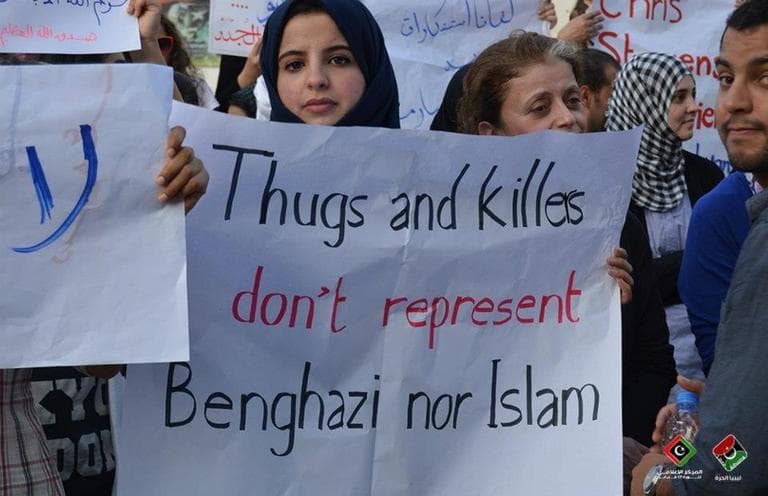Advertisement
Libyans Speak Out Against Protest Violence

The majority of the protests in the Middle East, Africa and South Asia over an American-made film that mocks Islam have been denouncing the west.
But a small number of people in Libya have been counter-protesting by expressing support for the U.S., including Libyan-American Heba Ben Omran, who was born in Libya, spent most of her life in the U.S. and recently moved back to her birth country after the fall of Moammar Gadhafi. Ben Omran spoke with Here & Now's Sacha Pfeiffer.
Interview Highlights
On What Made Her Join Counter Protest
"We condemn these acts of violence that were against the U.S. Embassy, or U.S. consulate I should say, here in Benghazi and we are very, very sorry for what happened and truly sorry for the loss of a dear friend, as we consider Ambassador Christopher Stevens."
On Why Signs At Counter Protest Were In English
"They are indeed trying to send a message to the west saying, you know, we are not your enemies. We are with you and, you know, when Obama came out to speak and Secretary Clinton, there was a lot of tears being shed and there was a lot of joy. Because what they said, they were sending a message that something like this is not going to ruin our relationship. We’re going to continue working with you and continue being, you know, allies."
On Why This Film Is Offending Many Muslims
"It is disturbing that someone would try and attack Islam in this manner and cause the reactions that it has caused today. Middle easterners, we don’t mock religion. You have your religion and I have my religion and we respect all the religions of the world. So, it is very disturbing to see something like this being done. But I honestly don’t think it’s even worth taking the time to watch [the video]."
On What It's Like To Watch Unrest
"It’s really heartbreaking, it’s very emotional. I know the morning after the attack, I just sat there and cried. This is not what we fought so hard for. Toppling Qadaffi was something really big and we rose in the eyes of many across the world. It’s so hard, as a Libyan-American, to be dealing with this right now when we’ve worked so hard to get where we are."
"There’s a lot of my friends and family that are moving from the U.S. back to Libya to try and help rebuild this country, something that we only dreamed of prior to February 17th, the day the revolution started. It was just a dream at that time, and now that we’re able to do so, [but now] it’s kind of like a lot of people are putting their lives on hold. Some people have decided to stay in the U.S. until things have calmed down but, you know, as a Libyan-American it is really hard to live on both sides of the spectrum and deal with all of this that’s going on."
This segment aired on September 14, 2012.